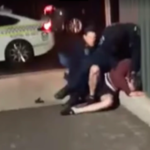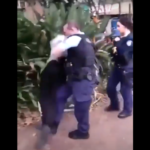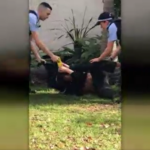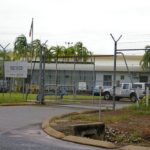Police Officer Threatens to ‘Belt the F***’ Out of Indigenous Teens
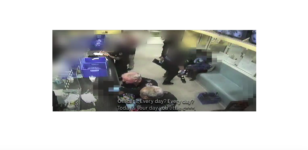
Shocking CCTV footage from the Alice Springs watchhouse showing a police officer shoving and verbally abusing a teenage boy before threatening to “belt the fuck out” of three others has emerged this week.
The footage was taken in 2018, but has only recently been obtained by national broadcaster, the ABC, after a long Freedom of Information Battle.
The footage shows an officer twisting a boy’s arm around his back and pushing him into the charge counter while calling him a “cunt” and “a fucking waste of space”.
The officer then tells the other teens in custody he is “in the mood to lose his job” if they refuse to comply with his directions.
While the Northern Territory Ombudsman tabled an annual report to NT Parliament last year saying that the officer’s conduct ‘substantially exceeded’ appropriate police conduct, and it has been reported that two officers involved underwent disciplinary proceedings after the incident, it is not clear the outcome of those proceedings.
NT Police are refusing to provide further information, saying that the Ombudsman’s Act prevents the disclosure of information relevant to the watchdog’s investigation, including the outcome of the proceedings that resulted from it.
The community outrage is palpable
The teenagers were arrested for allegedly stealing a car and the offence of police pursuit (known as Skye’s law in NSW), only months after the end of the Royal Commission into the Detention and Protection of Children in the Northern Territory.
The Royal Commission which ran from 2016-2017 confirmed that over many years children detained in the NT had been mistreated, verbally abused, humiliated, isolated or left alone for long periods. Many children held in detention had been assaulted by staff, who either wilfully ignored rules or were unaware of the rules, and as a result, acted in breach of Australia’s international human rights obligations as well as some domestic laws.
Three years on from the Royal Commission into Youth Detention
So what has changed since the Royal Commission? Not a lot, even despite a change of government in the Northern Territory.
Those working at the front line say they were once so full of hope for change in the wake of the Royal Commission, but now, in the three years since it’s recommendations were handed down, very little real progress has been made.
While there has been a reduction in the overall rate of incarceration for Indigenous children, they are still grossly overrepresented in detention and in the criminal justice system more broadly.
Children on remand are still being incarcerated, and some are still being sent to Don Dale, which was ordered to be shut down, but remains in operation until a new facility is completed.
Change requires political will
Those representing indigenous Australians are fighting hard for all of the Royal Commission’s recommendations to be implemented, particularly putting in place strategies to deliver young people from detention and raising the age of criminal responsibility from 10 years.
They also hope to change the local police culture’s ‘overemphasis’ on arresting young people.
It’s disheartening to see that there isn’t more political will for substantial change. And it most certainly begs the question whether the millions of dollars of taxpayer funds spent on conducting Royal Commission Inquiries are actually worth it, when time and again, the findings appear to go largely ignored.
A case in point is the Royal Commission into indigenous Deaths in Custody. In the three decades since its recommendations were handed down, very few have actually been implemented. And a further 432 indigenous people have died in temporary police custody, or while serving prison time.
The Black Lives Matter protests which were attended by hundreds of thousands of Australians across the country earlier this year certainly show a social will for change. Isn’t it time that our politicians responded accordingly?


